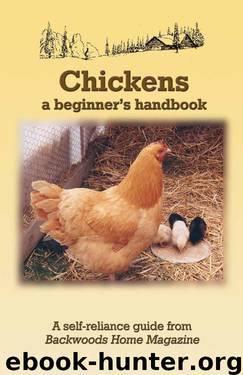Chickens: A Beginner's Handbook by Backwoods Home Magazine

Author:Backwoods Home Magazine [Magazine, Backwoods Home]
Language: eng
Format: epub
ISBN: 9780971844582
Amazon: 0971844585
Publisher: Backwoods Home Magazine
Published: 1989-07-15T04:00:00+00:00
Free ranging chickens
Many chickens are raised as free range birds; they range at free will over an extensive area, picking up what manner of food is naturally available. These chickens are healthier to eat, and they lay more nutritious eggs because of all the phytochemicals they ingest from wild foods. Their eggs will contain less cholesterol, less saturated fat, and more of vitamin A, vitamin E, vitamin B-12, beta-carotene, and will likely contain more omega-3 fatty acids as well.
Free range chickens require less feed during the summer months as they will eat a multitude of insects, weed seeds, spilled and wasted grain, etc. Broilers can be purchased every spring and started in the brooder house. When they are about two weeks old, give them access to a small outside enclosure, and by the time they are a month old they can have the run of the farm. It isn’t imperative to offer them any protein supplements or any purchased food once you turn them loose, giving them only cracked corn outside the brooder house each morning. Providing the corn and water near the brooder house will keep them from wandering too far. Also, if you keep a 60-watt bulb lit in the brooder house near dusk, the chickens will automatically go inside by the time it gets dark, and all you have to do is shut the door to keep them safe from varmints.
Free ranging works best for chickens being raised for meat. Egg-layers may start laying their eggs all over the yard. For this reason laying hens should be kept confined initially to get them used to laying in the coop, then allowed to free range so they have easy access to the coop. They will usually, but not always, go back in the coop to lay. You may have to hunt for some eggs.
It is a good idea to provide all chickens with grit (whether picked up naturally outside or purchased) and crushed oyster shell. The grit grinds the chickens’ food and the oyster shell provides a good source of calcium which builds good bones and thick egg shells.
Water should be made available to the birds at all times. Even in the winter, bringing a bucket of warm water out to the coop twice a day will be much appreciated by the chickens and will help them survive the cold and keep them laying happily.
Download
This site does not store any files on its server. We only index and link to content provided by other sites. Please contact the content providers to delete copyright contents if any and email us, we'll remove relevant links or contents immediately.
The Secret History by Donna Tartt(19092)
Goodbye, Things by Fumio Sasaki(8587)
Wonder by R. J. Palacio(8113)
Turbulence by E. J. Noyes(8052)
How to Be a Bawse: A Guide to Conquering Life by Lilly Singh(7487)
The Thirst by Nesbo Jo(6944)
Kaplan MCAT General Chemistry Review by Kaplan(6934)
The Testaments by Margaret Atwood(6904)
The Last Wish (The Witcher Book 1) by Andrzej Sapkowski(5468)
Spare by Prince Harry The Duke of Sussex(5197)
The Body: A Guide for Occupants by Bill Bryson(5098)
The Rules Do Not Apply by Ariel Levy(4970)
On Writing A Memoir of the Craft by Stephen King(4945)
Audition by Ryu Murakami(4932)
The Doodle Revolution by Sunni Brown(4768)
Gerald's Game by Stephen King(4654)
Adulting by Kelly Williams Brown(4576)
Millionaire: The Philanderer, Gambler, and Duelist Who Invented Modern Finance by Janet Gleeson(4479)
Housekeeping by Marilynne Robinson(4449)
